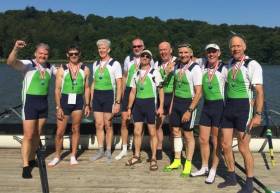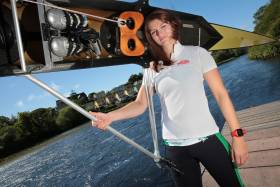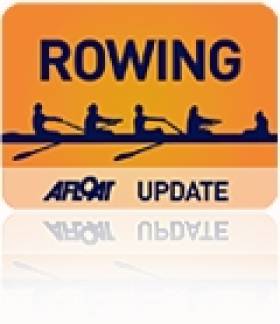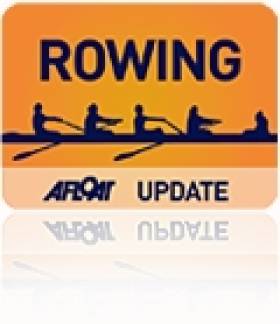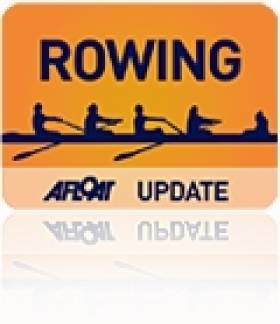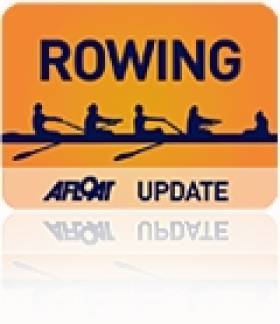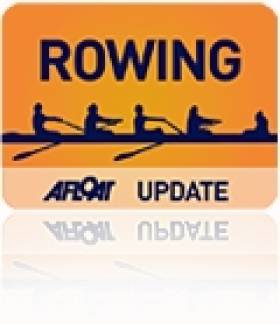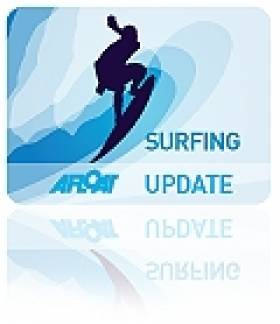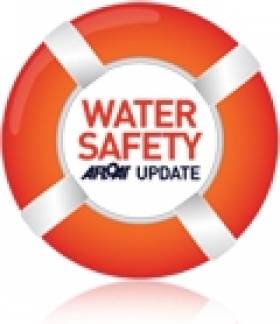Displaying items by tag: Irish
Irish Masters Eight are Afloat Rowers of Month
#Rowing: The Irish eight which won at the World Masters Regatta at Lake Bagsvaerd, Denmark, have been chosen as the Afloat Rowers of the Month for September. There were a number of good results by Irish crews at the event, which is one of the biggest international events of the year. Among the competitors this year was Denmark legend Eskild Ebbesen. The Irish E eight (55 years or older), was drawn from five clubs (Commercial, Belfast Boat Club, Neptune, Old Collegians and Waterford Boat Club) and outpaced German and British rivals in a field of seven crews. They had also won last year at this level. The crew was: John Hudson, Denis Crowley, Gerry Murphy, Mick Heavey, Colin Dickson, Colin Hunter, Fran O’Toole, Donal Mc Guinness and cox Al Penkert.
Rower of the Month awards: The judging panel is made up of Liam Gorman, rowing correspondent of The Irish Times, and David O'Brien, editor of Afloat magazine. Monthly awards for achievements during the year will appear on afloat.ie and the overall national award will be presented to the person or crew who, in the judges' opinion, achieved the most notable results in, or made the most significant contribution to rowing during 2016. Keep a monthly eye on progress and watch our 2016 champions list grow.
Jacob and Neale and Dukarska Qualify at Henley
#Rowing: Dave Neale and Sean Jacob in the Double Sculls and Monika Dukarska in the Princess Royal for single scullers came through the qualifiers at Henley Royal Regatta today. Both are open events. Lady Elizabeth also made it through in the Wyfold for club fours. Trinity’s second crew, who rowed into a powerful headwind, fell just outside the qualifiers in the Prince Albert for student coxed fours.
Henley Royal Regatta – Qualifying Races (Irish interest)
Qualifiers: Princess Royal (Single Sculls; Women; Open): M Dukarska.
The Double Sculls Cup (Men; Open): D Neale and S Jacob.
Wyfold (Fours; Club): Lady Elizabeth BC
Non Qualifier: Prince Albert (Fours, coxed; Student): Trinity College, Dublin B
Great Day for Enniskillen at Irish Schools Regatta
#ROWING: Two schools from Enniskillen took some of the major honours on offer at the Irish Schools Regatta at O’Brien’s Bridge. Enniskillen Collegiate won the women’s under-23 eights, fours and pairs, and Portora Royal School won the under-23 eights and pairs. Presentation Brothers College, Cork, took the men’s coxed fours. Waterpark College’s Andrew Goff was the top single sculler, and Sarah Murphy of Gaelcholáiste Luimnigh the top women’s sculler.
Irish Schools Regatta 2015, O’Brien’s Bridge, Selected Results
Men
Eight – Under-23: 1 Portora, 2 St Joseph’s, 3 Presentation, Cork. Junior 16: 1 St Joseph’s, 2 Col Iognáid, 3 Presentation, Cork. Jun 15: 1 St Joseph’s, 2 Pres, Cork, 3 Portora.
Four – Under-23, coxed: 1 Pres, Cork, 2 St Joseph’s, 3 CBS, Cork. Jun 16: 1 Portora, 2 Col Iognáid, 3 St Joseph’s B. Junior 15, coxed: 1 St Joseph’s A, 2 Portora, 3 Presentation Cork.
Pair – Under-23: 1 Portora A, 2 St Joseph’s B, 3 Ardscoil A.
Sculling
Quadruple – Under-23: 1 Schull CS, 2 Methody, 3 CBC, Cork. Junior 16, coxed: 1 Ardscoil A, 2 Methody, 3 Killorglin. Jun 15, coxed: 1 CBC Cork A, 2 CAI, 3 Methody.
Double – Under-23: 1 Schull CS A, 2 Marist, 3 Summerhill. Junior 16: 1 Rochestown, 2 Methody, 3 Pres, Carlow. Jun 15: 1 St Mary’s, Carlow, 2 CBC, Cork, 3 Castleknock.
Single – Under-23 (Final One, Timed): 1 Waterpark (A Goff), 2 St Munchin’s (Carmody), 3 Rochestown (Larkin). (Final Two, Timed): Portora (Murray). Jun 16: 1 Castleknock (Meehan), 2 Rochestown (Larkin), 3 Ardscoil Dub (Lynch). Jun 15 – Final One: 1 St Mary’s, Carlow (J Keating), 2 Carrigaline CC (S O’Neill), 3 CBC (T Murphy). Final Two: Ardscoil (O’Byrne).
Women
Eight – Under-23: 1 Enniskillen, 2 Laurel Hill, 3 Mount Lourdes. Jun 16: 1 Col Iognáid, 2 Methody, 3 Laurel Hill. Jun 15: 1 Col Iognáid, 2 Enniskillen
Four – Under-23: 1 Enniskillen, 2 Mount Lourdes. Jun 16, coxed: 1 Col Iognáid B, 2 Enniskillen, 3 Col Iognáid A. Jun 15, coxed: 1 Col Iognaid, 2 Mount Lourdes.
Pair – Under-23: 1 Enniskillen, 2 Laurel Hill B, 3 Laurel Hill A.
Sculling
Quadruple – Under-23: 1 St Leo’s, 2 Loreto, Fermoy A, 3 Loreto, Fermoy B. Junior 16, coxed: 1 Gaelcholáiste Cheatharlach, 2 Regina Mundi, 3 St Leo’s. Jun 15: 1 Loreto, Fermoy A, 2 Christ the King, Cork, 3 St Brigid’s A.
Double – Under 23 (Final One, Timed): 1 St Angela’s, Cork, 2 Methody, 3 Ursuline, Sligo. Final Two, timed: Sacred Heart. Final Three, timed: St Leo’s B. Jun 16: St Dominic’s, 2 Sacred Heart, 3 Christ the King A. Jun 15: 1 Regina Mundi, 2 Loreto, Fermoy, 3 St Louis.
Single – Under-23: 1 Gaelcholáiste Luimnigh (S Murphy), 2 Christ the King (Cummins), 3 Methody (Deyermond). Junior 16: Scoil Mhuire (Synnott), 2 Loreto Fermoy (O’Sullivan). Jun 15 (Final One): Loreto, Fermoy (Murphy). Final Two: Loreto (McGirr).
Irish Indoor Rowing Championships Taking Entries
#IndoorRowing: The Irish Indoor Rowing Championships 2013 will be held in the UL Arena, Limerick on 23rd November 2013. Registration is now open for all events.
Individual races & team relays from ages 13 to 70+ years will be the order of the day. College students, seniors, juniors, internationals, para rowers and anyone with a will to win will be competing side-by-side in their own categories with competitors from all over hoping to pull a personal best or even get noticed for international duties.
The organizers hope to incorporate a greater online presence this time out, with possible streaming and up-to-date result broadcasts via twitter and text.
For more information, and to view the list of events go to www.IIRC.ie.
UCD Continue Good Irish Run at Henley Royal Regatta
#RowingHenley: UCD had a convincing win over University of Bristol in the Temple Cup for student eights at Henley Royal Regatta. UCD, with a higher rating, got an early lead. By the Barrier they had a clear water advantage and they were able to ease down the rating and come home with no extra energy expended. They won by four lengths.
Henley Royal Regatta, Day One (Irish interest)
Temple Cup (Eights, Student): UCD bt University of Bristol 4l, 6:57
Prince Albert (Coxed Fours, Student): Trinity College, Dublin bt University of Virginia A ¾ l 7:24.
Tough Draws for Irish Club Crews at Henley Regatta
# ROWING HENLEY DRAW: Irish club crews have been given some tough draws for Henley Royal Regatta, which begins on Wednesday. Three of the five have drawn selected (seeded) crews: UCD’s strong Visitors’ Cup four will face Harvard A; Belfast Boat Club take on Union Boat Club of the United States in the Britannia and Trinity face the might of University of Virginia in the Prince Albert for student fours. The two exceptions are in the Prince of Wales, where Commercial take on PB and DRC and Anglia Ruskin and the Temple Cup where UCD are drawn against University of Bristol.
Henley Draw (Irish interest)
Temple Cup (Eights, Student): UCD v University of Bristol
Visitors Cup (Fours, Intermediate): UCD v Harvard A (selected crew)
Prince of Wales Cup (Quadruple Sculls, Intermediate): Commercial v PB and DRC and Anglia Ruskin
Britannia (Coxed Fours, Club): Belfast BC v Union BC (US) (selected)
Prince Albert (Fours, Student): Trinity v University of Virginia (selected)
Double Sculls (Open): R Chambers, P Chambers (selected) v winners of Knight and Bell and Mole and Fisher in quarter-final
Diamond Sculls (Single Sculls, Open): A Campbell (selected) v winner of GP Bozhilov and DS Read in quarter-final
UCD's Men and Women Take Irish University Honours
#UNIVERSITY ROWING: UCD took the Wylie Cup for men and the Bank of Ireland Cup for women at the rescheduled Irish University Championships at Blessington Lakes tonight. Trinity won the novice eight categories for both women and men, but UCD won both intermediate and senior eights races. In senior men’s eights, NUIG took second, while UCD vanquished their only rivals, Trinity, in the women’s senior eights.
The weather had forced the postponement of the Championships originally and winds were again a factor tonight, with all but these six races stripped from the programme.
Learn To Surf - Through Irish!
#Surfing - Fancy learning to surf as Gaeilge? One surf school in the sunny southeast is giving international visitors the opportunity to do just that.
The Freedom Surf School in Tramore, Co Waterford offers 'Ireland's only accredited surfing certificate course through the Irish language'.
And in time for The Gathering initiative, this summer the school is running a series of surf camps for developing oral skills through actively learning the language.
These five-day camps involve classroom tuition in the mornings, while the afternoons will be spent surfing trí Ghaeilge - all led by qualified Irish teachers and surf instructors.
For more details visit the Freedom Surf School website HERE.
Irish Tourist Drowns in Melbourne
#WATER SAFETY - A 27-year-old Irish tourist had died after drowning in Melbourne, Australia on Tuesday, the Sydney Morning Herald reports.
The tourist and a colleague, who have not yet been named, had reportedly entered the Yarra River in central Melbourne around 9pm intending to swim across. Some minutes later screams were heard from the water.
"At first I thought they were joking, I think most people did," said David Brearley, a barman at the nearby Riverland bar who had warned the pair not to attempt the crossing - but responded to the calls for help and swam out into the river.
Brearley was able to take one man to the shore where he was treated by paramedics. But the other man was lost despite the assistance of other bystanders.
His body was discovered some three hours later floating near a bridge close to the incident.
Paramedic Susie Dean praised Brearley's actions as "absolutely heroic", noting that there is "a very strong current in the Yarra".
The Sydney Morning Herald has more on the story HERE.
Irish Couple Among the Rescued from Capsized Cruise Ship in Italy
#NEWS UPDATE - An Irish couple were among those rescued from the cruise ship that ran aground off the coast of Italy on Friday night, the Irish Examiner reports.
Three people are believed to have died, while 14 others were injured, after the Costa Concordia struck a sandbank and capsized off the Tuscan coastline in the Tyrrhenian Sea.
The vessel was carrying more than 4,000 passengers at the time, many of whom jumped into the water as panic set in after the ship hit a rock that tore a 150ft gash in the hull.
As of Saturday three bodies had been recovered from the sea, with at least three more feared drowned.
The Department of Foreign Affairs confirmed that an Irish couple on board are safe and well, and are receiving consular assistance. Many survivors are taking refuge on the small island of Giglio close to the incident.
The Irish Examiner has more on the story HERE.


























